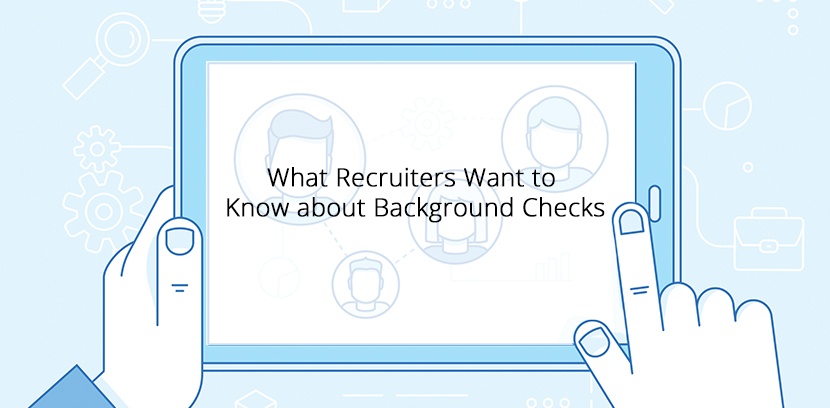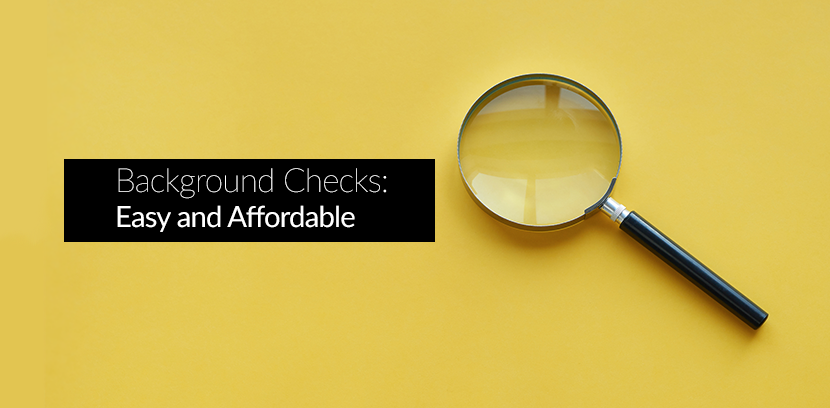What Recruiters Want to Know about Background Checks

Recruiting and hiring can be quite the challenge in today's market due to changes in regulations, the "gig economy" and more millennials entering the workforce. VeriFirst's mission is to assist employers and recruiters in order to meet the following goals:
- Hire the right person the first time
- Make the hiring process as time and cost efficient as possible
- Stay compliant and out of a courtroom
With over a decade of experience in background checks and working with employers, we're answering some common frequently asked questions.
What's the quickest way to get a background check?
Many recruiters suffer from FOMO - fear of missing out. Time is of the essence when an employer needs to hire someone to fill or refill a role, like yesterday. The search term "quick background check" reveals millions of results (and "free" too!) but taking this route is not advised. Quick or free internet background checks can lead to misleading or inaccurate information, false positives, outdated or incomplete data and could potentially put other employees or customers at risk in the case of negligent hiring. Employers could also face lawsuits if the information gathered is not true and precludes an applicant from being hired.
Running a background check through a professional screening company doesn't mean that the results will take a long time. Screening results are returned faster if all data on the applicant is correct and only the relevant-to-the-job background checks are run. In some cases, the most accurate results have to be obtained directly at the source - municipal or state courts. Not all of these courts will report regularly to databases. Professional background check companies will do all of the source data searching and double checking to make sure the results are the most current and accurate. It may take a little longer than a "free and quick" search but employers can feel secure in the information received.
Can I use social media in a background check?
If social media is readily available on an applicant, recruiters may do a little snooping. What can happen, however, is that the candidate's social media sharing could come back to haunt them. Social media can pose the following challenges:
- False or inaccurate information - There could be someone else with the same name or fake accounts that do not put the candidate in a good light with the employer. At the same time, the social media presence could be untrue, revealing something of a false character instead of the applicant's true nature.
- Some states prohibit the use of social media in employment screening - Because social media may reveal religious affiliation or sexual orientation, this information could be used against the job applicant.
If a candidate is being recruited over social media, such as LinkedIn, then obviously the information will be reviewed by recruiters. Also, if the position is in a social media or digital marketing field, recruiters may search social media to see if the candidate has experience.
In general, if a candidate isn't a good fit for the job, the same FCRA regulations apply. Adverse action should be taken and an explanation given as to why the candidate wasn't a good fit for the employer. If social media posts are the reason, the employer must give valid evidence that they have the correct information.
How can you tell if a candidate is lying on their resume?
A 2015 survey by Career Builder found that most hiring managers spend less than 5 minutes reviewing a resume. Job candidates know that their resume has to stand out above the rest. Some resume untruths include:
- Fudging on achievements to match job requirements
- Including job titles they didn't have or claiming companies that don't exist
- Misrepresenting employment dates from various jobs
- Lying about college degrees or claiming non-existent colleges
Recruiters must be savvy when reviewing resumes because small businesses come and go or are merged with others. Background screening can help expose fraudulent claims on resumes. While the college or employer may not show up during an internet search, professional background check companies have research experience and know where to look to verify resume data.
So many more hiring questions! Where to start?!
We've written several posts on these and more questions including:
- Isn't there a single criminal database to use for screening? Actually no, despite what TV crime dramas tell you.
- How to we verify immigrants or refugees can work in the United States? E-Verify may be mandated nationwide. Here's what employers need to know.
- Drug screening. Do we have to? Some employers don't want the hassle but if the business is regulated by the federal or state government, employees may be subject to drug testing for the health and safety of others. A drug screening policy will include which jobs should be screened and what drugs to screen for.
- What can I expect to pay for a background check? Again, there are many different kinds of background checks that can be run on an applicant. It really depends on which screens are relevant to the job. For reference, here's a list of background check prices.
The good news is that we regularly write about the questions we're hearing from recruiters and employers. Subscribe to the VeriFirst blog, leave a comment or contact us. We'll share our experience or do our research to ensure all questions are answered.
Share this
You May Also Like
These Related Stories

Why Do Some Background Checks Take Longer than Others?

Easy and Affordable Background Checks


